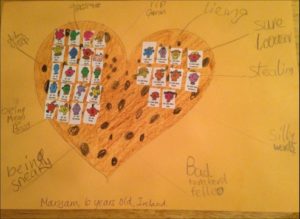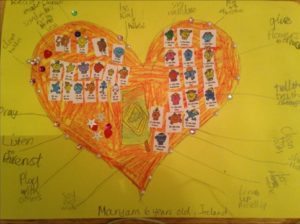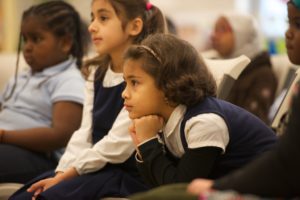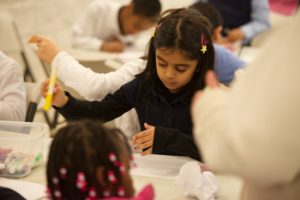Curriculum
When small children are presented with truth, they recognize it; they cannot bear injustice or lying. The Ghazali educational package presents essential teachings in a simple and enjoyable way, making otherwise deep concepts accessible and easy to live and grow by.
Abu Hamid al-Ghazali’s timeless teachings are the foundation of the Ghazali Children’s Project. Learn more about the scholar’s influential life and works as explained by Hamza Yusuf, Islamic scholar and president of Zaytuna College.
curriculum objectives
The aim of the Ghazali Children’s Project materials is to support children:
- in their ability to recognize and maintain their innate human dignity.
- in becoming aware of and identifying with their True Selves rather than with their lower, false, egoic and separative nature.
- in becoming self-observant and self-correcting.
- in realizing nobility of character by understanding, loving, and practicing the inner dimensions of all outward acts – to stop simply just “going through the motions”.
- in living life with humility and in service.
These objectives are realized through:
- Core teachings presented in stories and reinforced by workbooks, curricula, and the website.
- A curriculum which encourages self-observation and correction with activities such as quiet time doing one’s heart drawings, the Virtue Box, and more.
- Social service built into the calendar.
- Play-acting both the vices and their corresponding virtues so that both the unpleasantness of the vice is better understood, and the correct act practiced is experienced as pleasurable.
- Role modeling from teachers, parents, and other students. When all community members work to embody what Ghazali is transmitting, not only will the students improve, but the community as a whole will be transformed.
- And many other activities.
Curriculum guides
Themes from the Book of Knowledge
- Divisions of Knowledge, its importance and sacred sources.
- The brevity of human life, whose true purpose is to know and worship God and prepare to meet Him.
- The Two Worlds: The fleeting enjoyment of this world and the Eternal Peace in the Abode of Permanence.
- Human dependence on God, trust in His Will.
- The polishing of the Spiritual Heart: self-observation and correction, key virtues, and harmful vices.
- The provisions and focus for life’s journey, the importance of not wasting time.
- The quality of the true teacher and responsibility of the student: we are all teachers.
- Putting knowledge into practice.
The Book of Belief
Book of Belief
In Book Two, the Book of Belief, Imam al-Ghazali explains the nature of God – Who and What and Where He is. This book then goes on to talk about accountability and what happens after we die.
The Book of Purity
Book of Purity
Now that you have learned some ways to polish your heart from the Book of Knowledge and also about what happens to us after death from the Book of Belief, when we are responsible
and accountable for how we have used our lives in this world, we turn to this essential book which will help you to better understand the importance and the meaning of purity.
What we are giving you here, from Imam al-Ghazali’s third book of the Revival of the Religious Sciences, are some of the inner meanings of purity which you will find fascinating and useful.
What he explains will greatly help all of you in your noble effort to polish your beautiful, shining hearts.
The Book of Prayer
Book of Prayer
Downloads
Table of Contents
Curriculum Guide
The Book of Hajj
Book of Hajj
Downloads
Table of Contents
Curriculum Guide
Questions on how to present the material? See the Introductory Guide/FAQ






